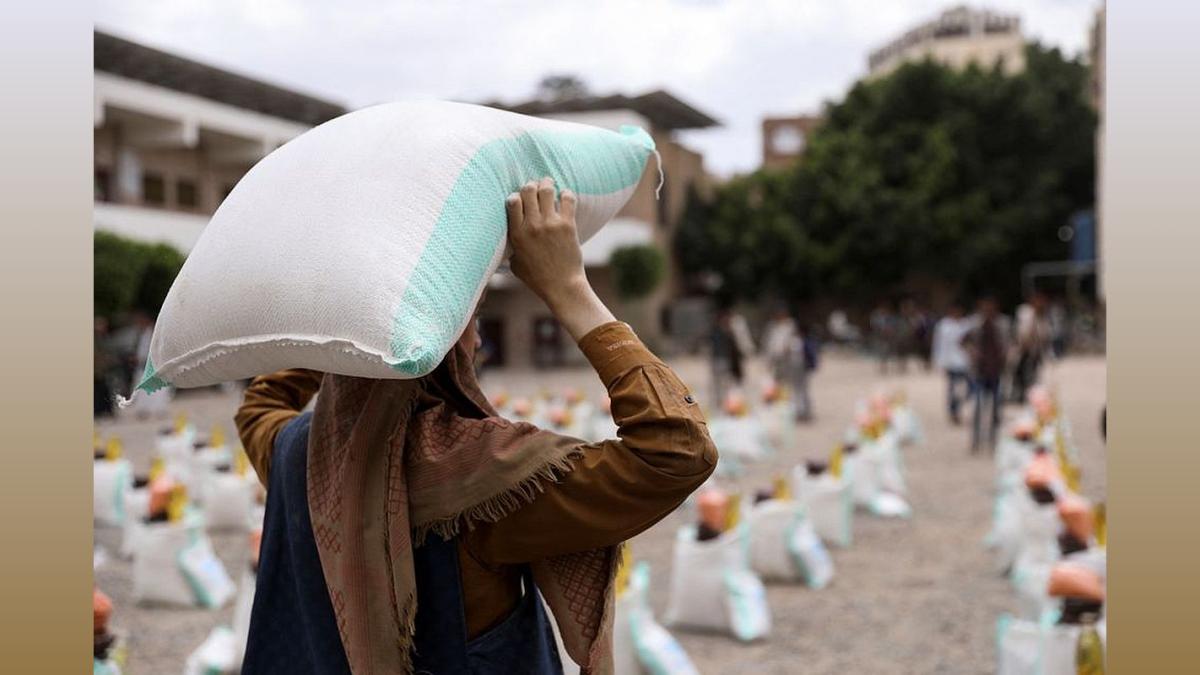UN's 'Pact of the Future' Falls Short on Security Council Reform: India
India criticizes the UN's 'Pact of the Future' for failing to adequately address calls for Security Council expansion and text-based negotiations. India emphasizes the need for reform within a fixed timeframe, advocating for a more representative and efficient UN.

Photograph: Khaled Abdullah/Reuters
United Nations, Oct 8 (PTI) India has said that the 'Pact of the Future', adopted by consensus by world leaders here last month, falls short in capturing views expressed by a majority of UN member states calling for Security Council expansion and beginning text-based negotiations on reform within a fixed time frame.
The UN hosted the landmark Summit of the Future during the high-level General Assembly session in September where world leaders had adopted by consensus the Pact of the Future'.
India's Permanent Representative to the UN Ambassador P. Harish, addressing the 79th Session of the UN General Assembly on Strengthening of the United Nations system', said that India would have liked to see a more ambitious Chapter Five, referring to the Pact's chapter on transforming global governance that includes language on reform of the UN Security Council.
Harish said that Delhi continues to believe that the Inter-Governmental Negotiations input for the Summit of the Future did not go far enough in addressing the critical issues related to UN Security Council reforms and expansion.
We wish that the views expressed by the majority of the UN member states had been clearly captured - in particular with regard to the expansion of UNSC in both permanent and non-permanent categories and beginning text-based negotiations within a fixed time frame. On this aspect, the Pact definitely falls short, Harish said.
The Pact talks about the need to enlarge the Security Council in order to be more representative of the current UN membership and reflective of the realities of the contemporary world.
With the UN turning 80 next year, the Pact underscores the need for reform of global institutions, a path forward for action on Sustainable Development Goals, climate action and use of artificial intelligence among other areas. It however does not contain timelines for actions required to achieve these goals.
Harish referred to Prime Minister Narendra Modi's address to the Summit of the Future, where he had said that reform is the key to relevance.
India iterated that while there is progress in the language on the reform of international financial architecture, more needs to be done in strengthening the participation of developing countries in international financial institutions, as well as in urgently and effectively addressing debt vulnerabilities.
He said that in this regard, the G20 New Delhi Leaders' Declaration and the Pact for the Future converge on some key principles such as: making the international financial system more inclusive, sustainable, and resilient while advocating for stronger, more democratic global financial institutions.
India also voiced appreciation for the strong message condemning terrorism in the Pact, which continues to be a serious threat to global peace and security, while areas such as cyber, maritime and space, emerge as new theatres of conflict. On this, we would like to stress that Global Action must now match Global Ambition, Harish said.
Emphasising that the world, as well as its concerns and opportunities, have changed profoundly, Harish said that it is essential that the UN be the central platform for finding common ground and a way forward through reformed multilateralism.
A UN that is effective and efficient; more representative and fit for purpose in the contemporary era, is therefore essential. The Pact and its annexes are a starting point, a means to an end, as we collectively work towards changing the world for the better.
The Pact included a Global Digital Compact and a Declaration on Future Generations as annexes.
He told the General Assembly that India had actively and constructively engaged in the year-and-half-long consultations on the action-oriented document of the Pact of the Future.
Under India's vision of Vaisudhaiva Kutumbakam' or the World is One Family', we contributed towards making the Pact more human-centric and amplifying the voice of the Global South, Harish said adding that India's approach to the Pact aligned with its broader vision of inclusive and sustainable development, as articulated in the Viksit Bharat @2047' initiative to realize the goal of prosperous India.
While prioritising sustainable development, we tried to ensure that human welfare, food security, health security, energy security and climate finance are also addressed. Evasion of climate action responsibilities by the developed undermines the growth prospects of the developing, he said.
He further noted that India supports global digital governance, which ensures that national sovereignty and integrity are upheld. India visualizes a comprehensive framework for the development, deployment and governance of Digital Public Infrastructure (DPI) through an open and inclusive process.
DPI should be a bridge, not a barrier! We are pleased to see that the Global Digital Compact attempts to address this, Harish said.
The UN hosted the landmark Summit of the Future during the high-level General Assembly session in September where world leaders had adopted by consensus the Pact of the Future'.
India's Permanent Representative to the UN Ambassador P. Harish, addressing the 79th Session of the UN General Assembly on Strengthening of the United Nations system', said that India would have liked to see a more ambitious Chapter Five, referring to the Pact's chapter on transforming global governance that includes language on reform of the UN Security Council.
Harish said that Delhi continues to believe that the Inter-Governmental Negotiations input for the Summit of the Future did not go far enough in addressing the critical issues related to UN Security Council reforms and expansion.
We wish that the views expressed by the majority of the UN member states had been clearly captured - in particular with regard to the expansion of UNSC in both permanent and non-permanent categories and beginning text-based negotiations within a fixed time frame. On this aspect, the Pact definitely falls short, Harish said.
The Pact talks about the need to enlarge the Security Council in order to be more representative of the current UN membership and reflective of the realities of the contemporary world.
With the UN turning 80 next year, the Pact underscores the need for reform of global institutions, a path forward for action on Sustainable Development Goals, climate action and use of artificial intelligence among other areas. It however does not contain timelines for actions required to achieve these goals.
Harish referred to Prime Minister Narendra Modi's address to the Summit of the Future, where he had said that reform is the key to relevance.
India iterated that while there is progress in the language on the reform of international financial architecture, more needs to be done in strengthening the participation of developing countries in international financial institutions, as well as in urgently and effectively addressing debt vulnerabilities.
He said that in this regard, the G20 New Delhi Leaders' Declaration and the Pact for the Future converge on some key principles such as: making the international financial system more inclusive, sustainable, and resilient while advocating for stronger, more democratic global financial institutions.
India also voiced appreciation for the strong message condemning terrorism in the Pact, which continues to be a serious threat to global peace and security, while areas such as cyber, maritime and space, emerge as new theatres of conflict. On this, we would like to stress that Global Action must now match Global Ambition, Harish said.
Emphasising that the world, as well as its concerns and opportunities, have changed profoundly, Harish said that it is essential that the UN be the central platform for finding common ground and a way forward through reformed multilateralism.
A UN that is effective and efficient; more representative and fit for purpose in the contemporary era, is therefore essential. The Pact and its annexes are a starting point, a means to an end, as we collectively work towards changing the world for the better.
The Pact included a Global Digital Compact and a Declaration on Future Generations as annexes.
He told the General Assembly that India had actively and constructively engaged in the year-and-half-long consultations on the action-oriented document of the Pact of the Future.
Under India's vision of Vaisudhaiva Kutumbakam' or the World is One Family', we contributed towards making the Pact more human-centric and amplifying the voice of the Global South, Harish said adding that India's approach to the Pact aligned with its broader vision of inclusive and sustainable development, as articulated in the Viksit Bharat @2047' initiative to realize the goal of prosperous India.
While prioritising sustainable development, we tried to ensure that human welfare, food security, health security, energy security and climate finance are also addressed. Evasion of climate action responsibilities by the developed undermines the growth prospects of the developing, he said.
He further noted that India supports global digital governance, which ensures that national sovereignty and integrity are upheld. India visualizes a comprehensive framework for the development, deployment and governance of Digital Public Infrastructure (DPI) through an open and inclusive process.
DPI should be a bridge, not a barrier! We are pleased to see that the Global Digital Compact attempts to address this, Harish said.
You May Like To Read
TODAY'S MOST TRADED COMPANIES
- Company Name
- Price
- Volume
- Vodafone-Idea-L
- 11.65 (+ 3.56)
- 106772451
- Alstone-Textiles
- 0.28 ( -3.45)
- 44187760
- Mangalam-Industrial
- 0.88 ( -2.22)
- 39177573
- Sunshine-Capital
- 0.27 (+ 3.85)
- 35956340
- GMR-Airports
- 104.40 (+ 6.37)
- 30453005





